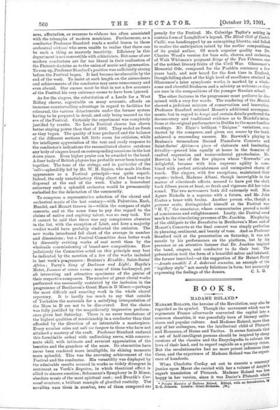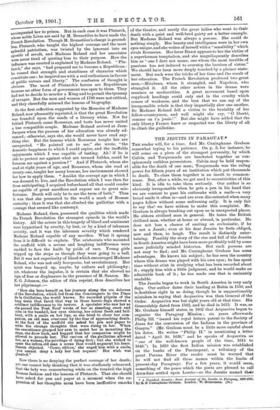BOOKS.
MADAME ROLAND.*
MADAME ROLAND, the heroine of the Revolution, may also be regarded as its symbol. Though the movement which was to regenerate France afterwards converted the capital into a common shambles, it was peacefully born of literary enthu- siasm and popular culture. And Madame Roland, more than any of her colleagues, was the intellectual child of Plutarch and Rousseau, of Hume and Tacitus. It seems fantastic that a set of half-intelligent persons should be inspired by cheap versions of the classics and the Encyclopedia to subvert the laws of their land, and to regard regicide as a primary virtue. But the revolutionaries had no more potent influences than these, and the experience of Madame Roland was the expeti- enee of hundreds.
When Charlotte Corday set out to execute a summary justice upon Marat she carried with her a volume of Aruybt's superb translation of Plutarch. Madame Roland was less happy in her version, since it was Dacier's Plutarch ivhich, • Private Memoirs of Madams Roland. Edited, with an Introduction, Ili E.G. Johnson. London: Grant Richards. Les.3 accompanied her to prison. But in each case it was Plutarch, whose noble Lives are said by M. Brunetiere to have made the French Revolution. Though M. Brunetiere's charge is ground- less, Plutarch, who taught the highest courage and the most splendid patriotism, was twisted by the ignorant into an apostle of revolt, and Madame Roland and her associates were never tired of quoting him to their purpose. How the
influence was exerted is explained by Madame Roland. "Plu- tarch," she says, "had prepared me to become a Republican : he roused that strength and stateliness of character which constitute one ; he inspired me with a real enthusiasm in favour of public virtues and liberty." The confusion of thought is obvious. The most of Plutarch's heroes are Republicans because no other form of government was open to them. They bad not to decide to murder a King and to permit the tyranny of savages. But the men and women of 1789 were not critical, and they cheerfully misread the lessons of biography.
So the first reflection suggested by the Memoirs of Madame Roland, now pleasantly reprinted, is that the great Revolution was founded upon the sands of a literary whim. Not far behind Plutarch came Rousseau, and taste has never united a less compatible couple. Madame Roland arrived at Jean- Jacques when the process of her education was already ad- vanced; otherwise, says she, she would never have read any- thing else. But the lessons which Rousseau taught her are unexpected. "He pointed out to me," she wrote, "the domestic happiness to which I could aspire, and the ineffable enjoyments which I was capable of tasting. Ah ! if he is able to protect me against what are termed foibles, could he forearm me against a passion ? " And if Plutarch, whom she read at eight years of age, and Rousseau, whom she read at twenty-one, taught her many lessons, her environment showed her how to apply them. "Amidst the corrupt age in which I
was doomed to live, and the Revolution which I was then far from anticipating, I acquired beforehand all that could render
me capable of great sacrifices and expose me to great mis- fortunes. Death will only be to me the term of both." Thus it was that she presented to the world a mask of Roman austerity ; thus it was that she climbed the guillotine with a courage that seemed like contempt.
Madame Roland, then, possessed the qualities which made the French Revolution the strangest episode in the world's
history. All the actors bi this tragedy of blood and sentiment were hypnotised by cruelty, by lust, or by a kind of inhuman severity, and it was the inhuman severity which rendered Madame Roland capable of any sacrifice. What it sprang
from it is difficult to explain. The aristocrats who mounted the scaffold with a serene and laughing indifference were
enabled to face the knife by pride of race. Young girls tripped up the steps as though they were going to a ball. But it was not superiority of blood which encouraged Madame Roland, who was not only bourgeoise, but revolutionary. Her spirit was buoyed up, maybe, by culture and philosophy;
yet, whatever the impulse, it is certain that she showed no sign of fear or displeasure in the presence of M. Sanson. Mr.
E. G. Johnson, the editor of this reprint, thus describes her last pilgrimage :—
"How she bore herself on her journey along the via dolorosa of the Revolution, which led from the Conciergerie to the Place de is Guillotine, the world knows. No recorded pilgrim of the long train that fared that way in those heroic days showed a sublimer indifference to its terrors. A spectator who saw her as she passed the Pont Neuf wrote of her as standing erect and calm in the tumbril, her eyes shining, her colour fresh and bril- liant, with a smile on her lips, as she tried to cheer her com- panion, an old man overcome by the fear of approaching death. At the foot of the scaffold she asked for pen and paper to write the strange thoughts that were rising in her. When the executioner grasped her arm to assist her in mounting the steps, she drew back, and begged that her companion might be allowed to precede her. The caskom of the guillotine allowed her, as a woman, the privilege of dying first; but she wished to spare the infirm old man a scene that would augment his fears. Sanson objected. 'Come, citizen,' she urged him with a smile, YOU cannot deny a lady her last request.' Her wish was granted."
Now there is no denying the perfect courage of her death; yet one cannot help thinking that it was studiously rehearsed, that the lady was remembering while on the tumbril the high Rotuan fashion and the lessons of Plutarch. That she should have asked for pen and paper at a moment when - the ex- Pression of her thoughts must have been ineffective smacks of the theatre, and surely the great ladies who went to their death with a quiet and well-bred gaiety set a better example. But Madame Roland was always a poseuse. She could do nothing simply. Her beauty and intelligence were in her own eyes unique, and she writes of herself with a " sensibility " which rivals Rousseau. Her lover Buzot appears to her the victim of a superhuman temptation, and she magniloquently describes him as "one I dare not name, one whom the most terrible of passions has not induced to overstep the barriers of virtue." We should have been more deeply touched by a plainer state- ment. But such were the tricks of her time and the result of her education. The French Revolution produced two great men,—Mfrabeau, whom it strangled, and Napoleon, who strangled it. All the other actors in the drama were maniacs or mediocrities. A great movement based upon copybook headings could only end in the cruelty which comes of weakness, and the best that we can say of the irresponsible rebels is that they impartially slew one another. So Madame Roland fell a victim to the brutality of her fellow-countrymen, and well might she cry, "0 liberte, comme on fa joutie ! " But she might have added that the only liberty France knew or respected was the liberty of all to climb the guillotine.















































 Previous page
Previous page